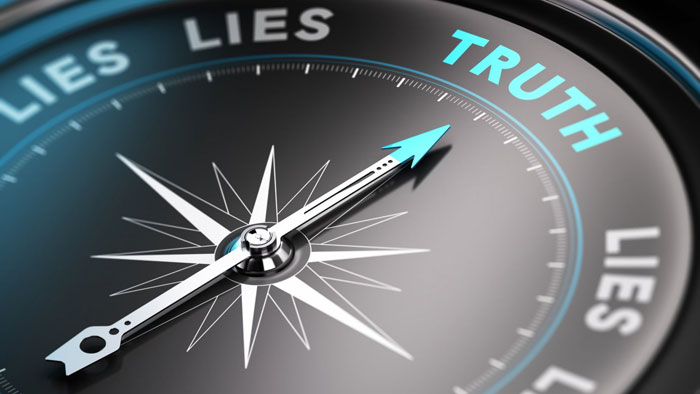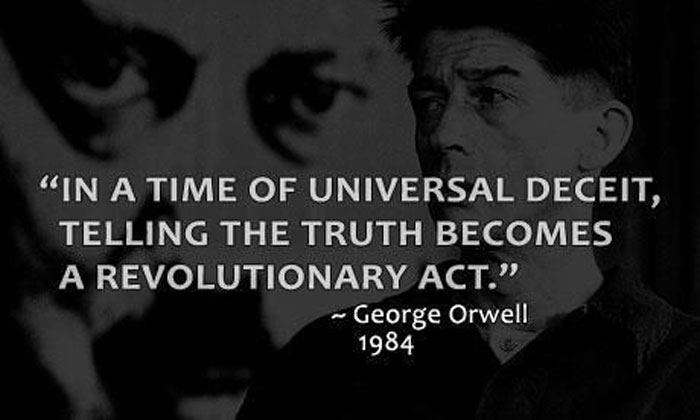Why is it important, or even desirable, to tell the truth? Lying our way through life is perhaps better, or at least lying occasionally, when necessary to support our preferred views or to satisfy our craving for things. We should note that we also contribute to the perpetration of lies when we believe them, thus supporting a cultures of lies. Speaking the truth and only believing truths, helps to create a culture of truth. The orientation of lies is towards evil whilst the orientation of truth is towards the good. Intuitively we know that ‘living a lie’, refusing to see the truth, does not bring good results and we often advise people against it.
Falsehoods have a negative physiological, mental and emotional effect on all the people involved. On the other hand it is highly beneficial for every aspect of our lives when our speech, thoughts and actions reflect reality. It is not only the persons concerned who are influenced but also all manner of other people who are touched by the truthfulness or untruthfulness.
A moral compass may be represented in terms of falsehoods and truths along a spectrum of subsidiary evil, malicious lies, careless lies, white lies, convenient lies, half-truths, shallow truths, subsidiary truths and all this within the transcendent ineffable truth of the goodness of creation and God. Falsehoods and truths may be expressed in thoughts, feelings, words or actions and they may be personally and collectively held.
The lies-to-truth spectrum is also the journey from evil to good and vice versa. We intuitively know goodness to be true. Moreover, the evidence for goodness is overwhelming. In our lives we see expressions of goodness in empathy and compassion, in family, friendships and community, in trust and reciprocity, in love and caring, in the sustaining natural world, in supportive eco-systems, in the wilful sacrifice for the common good and for future generations, in collaborative biodiversity. It is clear that creation is quintessentially good. “And God saw everything that he had made, and, behold, it was very good. And the evening and the morning was the sixth day.” (Genesis 1:31). This is not about the creation event taking place in six days. It is about a statement on the goodness of creation. Good has prevailed over evil, every time, and will continue to do so, albeit not always within the timespan of one human life.
The way of ascertaining what is true and what is false is not obvious and may be complex. The best place to start is with the highest principality of the transcendent and ineffable truth. “….If ye continue in my word, then are ye my disciples indeed; And ye shall know the truth, and the truth shall make you free” (John 8:31-32). Again, this is not about parroting the Bible. It is a fundamental statement on reality declaring that we need to abide in truth if we are ever to be free.
Lying betrays an intent to control outcomes. It therefore supports tyranny and enslavement both at a micro and macro level. Now this is not necessarily one person enslaving another. Mostly, in fact, we become prisoners, and therefore slaves, of our own deceptions. It is well known that lying requires more lying in order to cover up the original lies made to others as well as those made to ourselves. Lying hides reality, whilst truth reveals it.
Truth is not perfection. Perfection is a human obsession. Truth is when reality is properly represented.
Truth allows for the emergence of freedom. Ultimate truth is akin to the reality of life. Christ equates the reality of life and creation with the Word of God, which makes perfect sense of course. Although the highest transcendent good, that is God, cannot be defined, the saints show us that it can be known.
In the realm of men, intent matters, with one important proviso however, which is that ignorance is not a defence. No one person is exactly like another and we all experience truth differently, as different shades of the one transcendent truth. Let us call these many truths, ‘subsidiary truths’. Although these subsidiary truths are numerous, they are not in competition with each other as it is known that they are not the principle truth, but are all pointing to the principle truth. The mark of authenticity is one’s preparedness to sacrifice one’s present subsidiary truth to a higher one, every time, without attachment. This is how every one of us walks the path, step by step, towards an increasingly enlightened, meaningful life.
Some may think that forging a path towards joy and freedom is not possible in a world where predatory, narcissistic, sadistic and phsycopathic behaviour is so prevalent. These dark traits find their breeding ground in false beliefs, which are in fact deceptions, lies. The polarity of subsidiary good vs subsidiary evil, can also be expressed as the polarity of truth vs lies. I use the word ‘subsidiary’ deliberately as I am of the opinion that there is no such thing as ultimate transcendent evil. Ultimately there is only transcendent good. I believe that evil is what arises where good is not present, or not sufficiently present.
Try living in truth, without exceptions. Stand your ground. Be an oasis for all that is real, as backed up by your human senses. Hold your truths lightly, giving them up only in exchange for higher truths.
If you believe in a just and sustainable society, these other articles may interest you.



